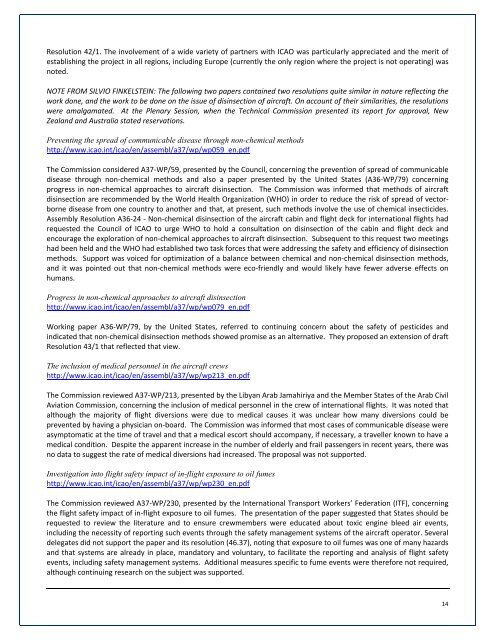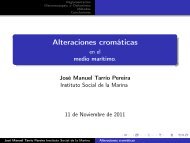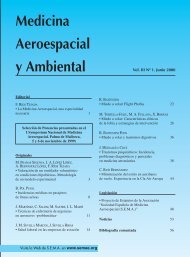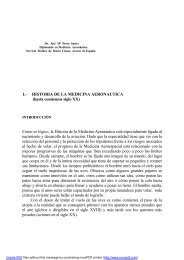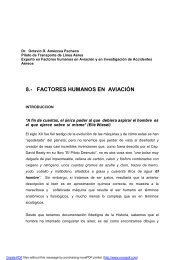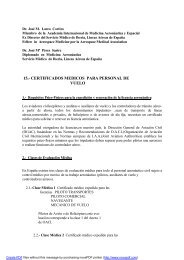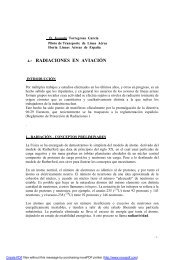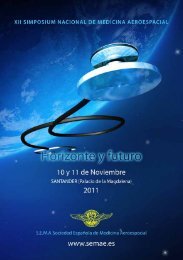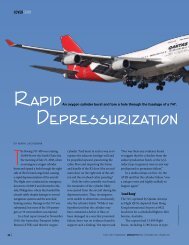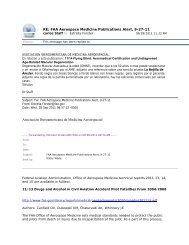AIMA Boletin Vol11 No2 (Diciembre/2010) - SEMA
AIMA Boletin Vol11 No2 (Diciembre/2010) - SEMA
AIMA Boletin Vol11 No2 (Diciembre/2010) - SEMA
You also want an ePaper? Increase the reach of your titles
YUMPU automatically turns print PDFs into web optimized ePapers that Google loves.
Resolution 42/1. The involvement of a wide variety of partners with ICAO was particularly appreciated and the merit of<br />
establishing the project in all regions, including Europe (currently the only region where the project is not operating) was<br />
noted.<br />
NOTE FROM SILVIO FINKELSTEIN: The following two papers contained two resolutions quite similar in nature reflecting the<br />
work done, and the work to be done on the issue of disinsection of aircraft. On account of their similarities, the resolutions<br />
were amalgamated. At the Plenary Session, when the Technical Commission presented its report for approval, New<br />
Zealand and Australia stated reservations.<br />
Preventing the spread of communicable disease through non-chemical methods<br />
http://www.icao.int/icao/en/assembl/a37/wp/wp059_en.pdf<br />
The Commission considered A37‐WP/59, presented by the Council, concerning the prevention of spread of communicable<br />
disease through non‐chemical methods and also a paper presented by the United States (A36‐WP/79) concerning<br />
progress in non‐chemical approaches to aircraft disinsection. The Commission was informed that methods of aircraft<br />
disinsection are recommended by the World Health Organization (WHO) in order to reduce the risk of spread of vector‐<br />
borne disease from one country to another and that, at present, such methods involve the use of chemical insecticides.<br />
Assembly Resolution A36‐24 ‐ Non‐chemical disinsection of the aircraft cabin and flight deck for international flights had<br />
requested the Council of ICAO to urge WHO to hold a consultation on disinsection of the cabin and flight deck and<br />
encourage the exploration of non‐chemical approaches to aircraft disinsection. Subsequent to this request two meetings<br />
had been held and the WHO had established two task forces that were addressing the safety and efficiency of disinsection<br />
methods. Support was voiced for optimization of a balance between chemical and non‐chemical disinsection methods,<br />
and it was pointed out that non‐chemical methods were eco‐friendly and would likely have fewer adverse effects on<br />
humans.<br />
Progress in non-chemical approaches to aircraft disinsection<br />
http://www.icao.int/icao/en/assembl/a37/wp/wp079_en.pdf<br />
Working paper A36‐WP/79, by the United States, referred to continuing concern about the safety of pesticides and<br />
indicated that non‐chemical disinsection methods showed promise as an alternative. They proposed an extension of draft<br />
Resolution 43/1 that reflected that view.<br />
The inclusion of medical personnel in the aircraft crews<br />
http://www.icao.int/icao/en/assembl/a37/wp/wp213_en.pdf<br />
The Commission reviewed A37‐WP/213, presented by the Libyan Arab Jamahiriya and the Member States of the Arab Civil<br />
Aviation Commission, concerning the inclusion of medical personnel in the crew of international flights. It was noted that<br />
although the majority of flight diversions were due to medical causes it was unclear how many diversions could be<br />
prevented by having a physician on‐board. The Commission was informed that most cases of communicable disease were<br />
asymptomatic at the time of travel and that a medical escort should accompany, if necessary, a traveller known to have a<br />
medical condition. Despite the apparent increase in the number of elderly and frail passengers in recent years, there was<br />
no data to suggest the rate of medical diversions had increased. The proposal was not supported.<br />
Investigation into flight safety impact of in-flight exposure to oil fumes<br />
http://www.icao.int/icao/en/assembl/a37/wp/wp230_en.pdf<br />
The Commission reviewed A37‐WP/230, presented by the International Transport Workers’ Federation (ITF), concerning<br />
the flight safety impact of in‐flight exposure to oil fumes. The presentation of the paper suggested that States should be<br />
requested to review the literature and to ensure crewmembers were educated about toxic engine bleed air events,<br />
including the necessity of reporting such events through the safety management systems of the aircraft operator. Several<br />
delegates did not support the paper and its resolution (46.37), noting that exposure to oil fumes was one of many hazards<br />
and that systems are already in place, mandatory and voluntary, to facilitate the reporting and analysis of flight safety<br />
events, including safety management systems. Additional measures specific to fume events were therefore not required,<br />
although continuing research on the subject was supported.<br />
14


